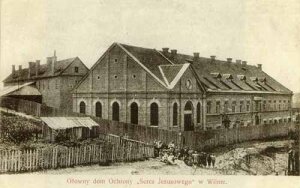- October 11, 2013
- 501
The Institute and the Salesian Society of the Sacred Heart of Jesus House in Vilnius

In 1905 priest Karol Lubianiec bought a terrain of 5100 square fathoms at a deserted land in the suburbs of the city, within a former Wielka Pohulanka district. It bordered Dobra Rada Street (Lithuanian: Gerosios Vilties), Pogodna Street, Karna Street. At that place he raised the first monument of his pious work – a high oak cross, placed formerly in the Institute’s garden.
At the same time he established a charitable association of the “Sacred Heart of Jesus”. He had been its chairman and its soul until August 1924. In 1908 he managed to raise the first single-storey building with Our Lady of Good Counsel Chapel. Officially, for the Russian authorities, it was just a craftsman’s workshop.
The Institution of the Sacred Heart of Jesus developed gradually. Not very significant at the beginning, with as few as a dozen or so orphans, even very little, 2- and 4-year-old girls and boys, it expanded to an enormous size. Next to the first house soon appeared the second, third and the fifth one. What is more, a Polish school was founded, directed by tireless Celestyna Frydówna. The whole possession was fenced and at the entrance gate there was a lodge where a trusted man was sitting. He warned us whenever a Tsar’s servant appeared. In such situation we hid the books and a classroom turned into a workshop. Soon, in 1912 the Russians issued a decree closing the shelter on the charge that the institution was not only an orphanage but also a secret Polish school (what it was indeed). Karol Lubianiec had to search for a mediator in Bavaria. After the persistent efforts he finally achieved success – the school was saved.
According to 1918 data there were about 500 children in the orphanage, including 300 children younger than 12. Girls and boys lived in a separate houses. Different craftsman workshops functioned there so children living at the orphanage were accustomed with one of the useful crafts, such as weaving, forging, household managing, etc. whereas the Divine Providence Church was a place where children and personnel prayed.
The honourable and respected founder, Karol Lubianiec, holding numerous duties at the diocesan seminary and Episcopal chapter, could no longer carry out his chairman position at this charitable institution. Being aware of the size of the institution he knew that, after the World War I, it needed better care. Hence he decided to give it to the Salesian Society in order to secure stable future for his work. The Salesians couldn’t have refused accepting such popular and highly valued institution as the Sacred Heart of Jesus House in Vilnius. Together with the Salesians, Daughters of Mary Help of Christians came there too. The nuns’ convent had the same founder as the Salesians’, John Bosco, and they administered the second part of priest Lubianiec work intended for girls – “Moderation and Work”. Apart from the regular school there was also a vocational school for older boys at the Sacred Heart of Jesus House. In 1932, next to the Divine Providence Church, Sodality of Our Lady for Working Men was created (the beginnings of the Sodalities go back to the 16th century). The Sodality was a way to educate the youth by connecting Christian life and studies. In June that year an official request was sent in order to reestablish that Sodality dedicated to Our Lady of Gate Dawn and blessed Andrew Bobola. The request was signed on the men’s behalf by Walenty Kompanowski, Master of law. The director of Salesian Institution at the Divine Providence Church in Vilnius was elected the moderator of Sodality.
Up to 1939 there lived 19 Salesians in Vilnius, including 9 priests, 5 seminarians and 5 brothers. At the beginning of the World War II the school together with the workshops were taken over by Lithuanian Salesians whereas Polish Salesians stayed at St. Stephen Church. So called repatriates brought from Vilnius to Poland, especially to Warsaw, archives connected with this church which formerly belonged to the Jesuits. Unfortunately, all the archives of the Warsaw Salesian Province were destroyed during the Warsaw Uprising in 1944. Four years later the Divine Providence Church at Dobra Rada Street in Vilnius was given to National Drama Theatre and was changed into decoration warehouse. The Neo-Gothic church and the craft workshops lost their initial destination.
Inscriptions on the poster:
EDUCATIONAL-CRAFT’S WORKSHOPS OF THE “SACRED HEART OF JESUS” ORPHANAGE
recommends its work and with great gratitude accept commissions to works:
Carpentry: altars, pulpits, benches, commodes, wardrobes, church and sacristy doors, living room, flats and offices furniture, painting and sculpturing.
Metalwork: church windows frames, crosses, fences, balustrades, balconies, waterworks, electric doorbells, machines, bikes and surgery tools repairing.
Shoemaking: all sorts of shoes, for men, women and children
Church works and embroidery: chasubles, veils, covers, flags, canopies, stoles, clothes for carrying the Host, church linen, linen embroidery (silk and golden)
Underwear sewing: men, women and children underwear
Crochet works: shawls, scarves, capes, bed covers, shirts, jerkins
Washing: underwear, tablecloths, dresses, church linen (we don’t use any chemical ingredients)
Musical instruments’ repairs: all the wind and stringed instruments’ repairs and new instruments selling
Hosiery: tights, socks, summer, winter stock, for men, women and children
Telephone number: No. 1079
Storehouse of hosiery and shoes: “Zachęta” at 5 Wielka Street
The workshop of hosiery and underwear: “Zachęta” at 26-14 Wileńska Street
Metal-mechanical workshop: “Zachęta” at 15 Zawalna Street
Workshop of musical instruments: at 5-6 Botaniczna Street
All prices moderate, good quality.
Source: http://pl.delfi.lt/kultura/kultura/zaklady-i-salezjanie-domu-serca-jezusowego-w-wilnie.d?id=63006062
Tłumaczenie by Elżbieta Szafarz w ramach praktyk w Europejskiej Fundacji Praw Człowieka, www.efhr.eu. Translated by Elżbieta Szafarz within the framework of a traineeship programme of the European Foundation of Human Rights, www.efhr.eu.

